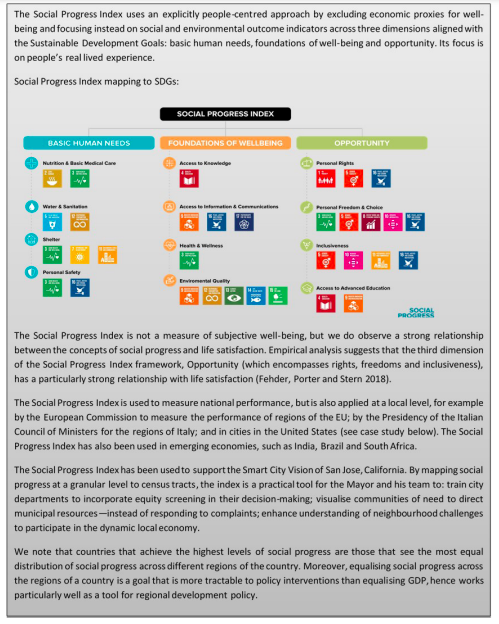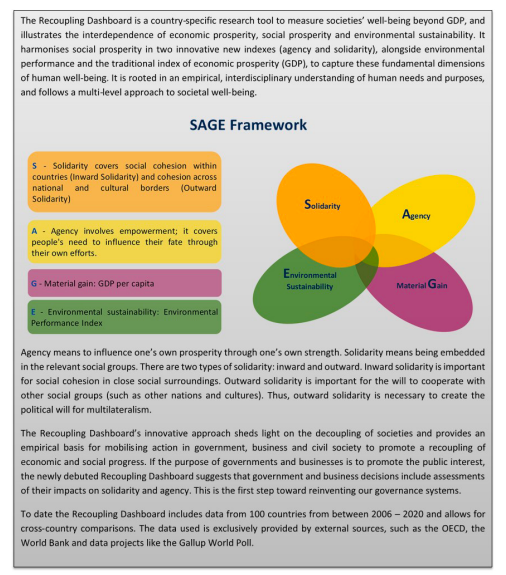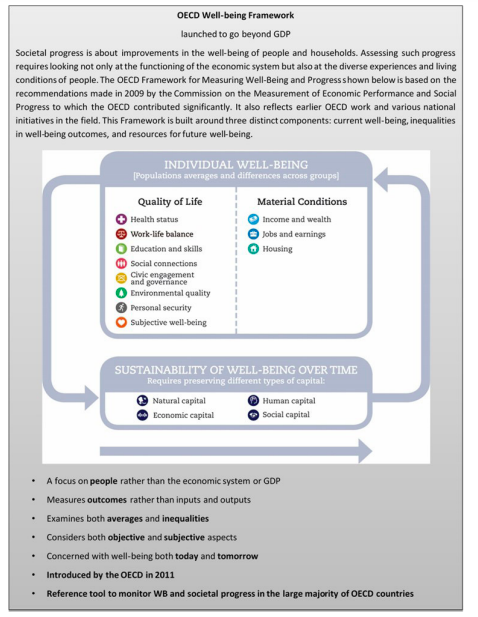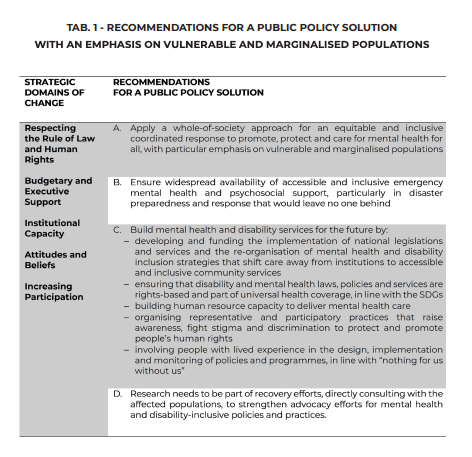The COVID-19 pandemic has changed the relationship between the market economy, state and society in almost every country worldwide. While the economy paused and literally shut down in many countries during the first wave of the pandemic, the state and civil society have gained new significance in protecting people from the ravages of the coronavirus. This shift has affected the public’s perception of the role of markets, government and society in response to the worldwide shock. In particular there is an increased recognition that societal well-being goes well beyond material prosperity and that society, governments and markets should contribute to enhancing human well-being in a sustainable fashion.
Challenge
The Italian G20 Presidency comes at a time when uncertainties concerning the evolution of the pandemic persist and its economic impact is expected to weigh heavily on economies and societies for many years. In addition, the global COVID-19 pandemic and climate crises have catapulted vulnerabilities that emerged from an equity chasm, leaving whole segments of the human population people with disabilities, older people, displaced and refugee populations, women and children particularly vulnerable to psychological, social and economic shocks. However, crises force re-evaluations, reconsiderations and reprioritisations to build forward better, on individual and collective levels, in institutions and among those that govern them, to promote equity, inclusion and well-being for all, leaving no one behind.
Against this background, the Italian Presidency is committed to contributing to the development of a shared vision to shape a brighter future for all, and promises that “All policy actions will be centered on people”. This makes it necessary to put fundamental human needs at the heart of policy making, in line with what the OECD (e.g. OECD 1994; 2013; 2020), Snower (e.g. Lindbeck and Snower 1989; Snower 1993; Bosworth, Singer, and Snower 2016; Lima de Miranda and Snower 2020) and the Social Progress Imperative (Porter, Stern, and Green 2016) have long advocated. The three pillars of the Italian G20 Presidency – “People, Planet and Prosperity” call for measurement of economic and societal performance that goes beyond GDP. While significant progress has been made on the international and national statistical agendas on multidimensional well-being measurement beyond GDP, we maintain that the G20 should systematically monitor progress through these multidimensional metrics, thus making it possible to assess the progress of the three pillars of the Italian G20 and in future G20 agendas. Such measurement should encompass not only aggregate indicators of material prosperity and inequality, but also environmental performance and social performance, with a particular focus on social solidarity, empowerment and opportunity, including physical and mental health, education and security. These policy objectives are closely related to the Sustainable Development Goals.
Proposal
We propose that the G20 monitor annually these key dimensions of success and progress for the G20 countries and beyond to inform development strategies and budget priorities.
Furthermore, we propose that the G20 investigate how these measures relate to public compliance with policies such as pandemic containment and climate action.
This brief discusses some possible measures of success and progress that encompass the dimensions of solidarity, agency, equitable economic well-being and environmental sustainability. These measures build on existing research and tools notably by the Global Solutions Initiative, the Kiel Institute, the OECD and the Social Progress Imperative developed over the last few years. The metrics discussed in this paper are not exhaustive and constitute a starting point for additional deliberations by the T20 that the G20 Italian Presidency may take forward and turn into a G20 dashboard. The brief also illustrates possible policy implications of such metrics, in lines with the priorities of the G20 Italian Presidency.
*The opinions and arguments expressed herein are those of the author and do not necessarily reflect the official views of the OECD or its member countries.
METRICS OF SUCCESS BEYOND GDP AND THEIR RELATION TO THE “THREE PS” OF THE ITALIAN G20 PRESIDENCY
PEOPLE
The “People” category is about individual well-being within thriving societies. Agency and solidarity are key to the understanding of individual and societal well-being. Agency covers the fundamental human purpose of individual mastery and personal growth, and aims to measure how empowered people in a society are to influence their fate through their own efforts. Solidarity covers people’s social needs and purposes for social belonging and embeddedness in society. It may be directed “inwardly” to one’s national, religious, ethnic, racial or class groups, or “outwardly” to groups with regard to which one does not define one’s social identity. Other measures and dimensions could be mobilised within the “People” dimension, in line with the SDG measurement approach or other frameworks for measuring people’s well-being (see for instance the OECD’s Well-Being Framework) or social progress (see for instance the Social Progress Index). However, at this particular juncture, we place an emphasis on one aspect of people’s lives which has been critically affected by the pandemic agency (the ability to shape one’s own destiny), as well as on one of the strongest factors of resilience to the crisis at societal level – “inward” solidarity (social connectedness within countries) and “outward solidarity” (the willingness to cooperate multilaterally across countries, for instance ensuring global access to vaccines in a fair manner across countries).
PLANET
The “Planet” category is about environmental sustainability. “Developing a safer and more sustainable world” is one of the visions that the Italian G20 presidency is advancing in its G20 agenda. This calls for action that contributes to “restoring the balance between people and nature”, in light of the severe environmental degradation and climate crisis, and the need to build forward better in a way that accelerates the transition to a net zero carbon economy. Incorporating environmental sustainability into measurement and decision-making needs to address the paradox that some environmental indicators tend to improve with economic growth (for example protection of the biome, and particulate air pollution), whereas other indicators tend to deteriorate (for example greenhouse gas emissions). It is also critical that this is done within a framework linked to people and prosperity, in order to address climate justice and ensure a “just transition” in tackling the climate crisis. Tools like the Recoupling Dashboard (Lima de Miranda and Snower 2020), the Social Progress Index (Stern, Krylova, and Harmacek 2020) and the Better Life Index (e.g. OECD 2020) integrate social and environmental indicators and therefore provide a roadmap to managing the climate crisis in an equitable and inclusive way.
PROSPERITY
The “Prosperity” category is about material standards of living and economic well-being. These can be measured in terms of the average wealth of a nation (aggregate GDP), as well as measures that map out the distribution of economic resources (e.g. Gini coefficients). Economic growth is not a goal per se, but a means to ensure prosperity for all and leave no one behind, as advocated by the 2030 agenda. While economic growth (in terms of GDP) does make a significant contribution to societal well-being, it is not the whole story other factors also determine a country’s level of success. In particular, movements of GDP do not provide an adequate account of how solidarity (S), agency (A) and environmental sustainability (E) evolve (see for example Lima de Miranda and Snower 2021). Social Progress Index data, for example, show that proxies for inclusive growth such as income inequality, employment and even income poverty do not fully explain social progress outcomes. If GDP grows while S, A and E stagnate or decline, economic prosperity becomes “decoupled” from social and environmental prosperity. The aim of policy should be to “recouple” these separate domains, ensuring that all four fundamental needs and purposes are met.
Social Progress Index data also suggest that higher social progress is associated with higher resilience to shocks like the COVID-19 pandemic. This suggests that rather than there being a trade-off between economic and social progress, the two can be mutually reinforcing.
CONCLUSION
G20-informed policy agendas, legislative and regulatory mechanisms, tools and innovations are in a position to consider measurable economic, social and environmental processes that can propagate equitable, inclusive and spatially efficient forms of normativity. As such, the recovery policies and recommendations ought to be actioned in a way that is proportionately universal, while recognising that universal responses are needed to trigger social and environmental investment, legislative and policy interventions, increased awareness and appropriate behavioural changes.
A comprehensive measurement tool that can serve as the global authority on assessing progress on people, planet and prosperity, while measuring, evaluating and informing policies on economic and social performance is needed to develop capacity, data, indicators, global data-driven analysis and knowledge aimed at identifying governance gaps and making informed policy decisions, with exacted solutions driving more prosperous, inclusive and equitable societies.
An actionable approach with a small number of clearly laid out indicators can help visualise how prosperity in different dimensions of human well-being is in (un)balance. The groundwork for prosperous and fulfilling lives, as well as for resilient and sustainable societal well-being, is established when people have a secure sense of social belonging (S), are empowered to influence their fate through their own efforts (A), are materially well off (G) and live within planetary boundaries (E).
Building on these insights, we recommend that the G20 should:
- discuss broader measures of success at the G20 Italy leaders’ summit;
- create a G20 working group to agree on a small set of clearly laid out indicators that encompass indicators of aggregate material prosperity, inequality, environmental performance (with particular reference to climate and biodiversity) and social performance (with a particular focus on social solidarity, empowerment and opportunity, including physical and mental health, education and security);
- monitor progress on the basis of these multidimensional metrics.
APPENDIX




NOTES
1 In the 2030 agenda from 2015 heads of states from all over the world have agreed that they “are determined […] to ensure that all human beings can fulfil their potential in dignity and equality and in a healthy environment”.
2 “We are determined to ensure that all human beings can enjoy prosperous and fulfilling lives and that economic, social and technological progress occurs in harmony with nature.”
REFERENCES
Bosworth S.J., T. Singer, and D.J. Snower, OECD, (2013), Activation Strategies for (2016), “Cooperation, motivation and social Stronger and More Inclusive Labour Marbalance”, Journal of Economic Behavior & kets in G20 Countries, G20 Task Force on Organization, vol. 126, pp. 72-94 Employment, Paris, OECD
Fehder D.C., M.S. Porter, and S. Stern, OECD, (2020), How’s Life? 2020: Measuring (2018), The Empirics of Social Progress: The Well-being, Paris, OECD Publishing Interplay Between Subjective Well-Being and Societal Performance, AEA Papers Porter M.S., S. Stern, and M.F. Green, (2016), and Proceedings, vol. 108, pp. 477-82 Social Progress Index Report 2016, Social Progress Imperative
Lima de Miranda K. and D. J. Snower, (2020), Recoupling Economic and Social ProsperiSnower D.J., (1993), “The future of the wealthy. Global Perspectives, vol. 1, no. 1, p. 11867 fare state”, The Economic Journal, vol. 103, no. 418, pp. 700-17.
Lindbeck A. and D.J. Snower, (1989), “Macroeconomic policy and insider power”, The Stern S., P. Krylova, and J. Harmacek, (2020), American Economic Review, vol. 79, no. 2, Social Progress Index 2020 Methodologipp. 370-76 cal Summary, Social Progress Imperative
OECD, (1994), The OECD Jobs Study: Facts, Analysis, Strategies, Paris, OECD https://www.oecd.org/els/emp/1941679.pdf
OECD, (2013), Activation Strategies for Stronger and More Inclusive Labour Markets in G20 Countries, G20 Task Force on Employment, Paris, OECD
OECD, (2020), How’s Life? 2020: Measuring Well-being, Paris, OECD Publishing
Porter M.S., S. Stern, and M.F. Green, (2016), Social Progress Index Report 2016, Social Progress Imperative
Snower D.J., (1993), “The future of the welfare state”, The Economic Journal, vol. 103, no. 418, pp. 700-17.
Stern S., P. Krylova, and J. Harmacek, (2020), Social Progress Index 2020 Methodological Summary, Social Progress Imperative








